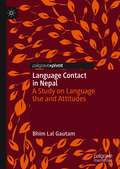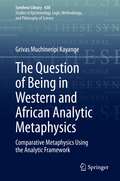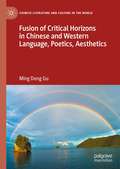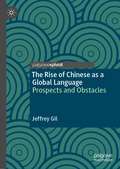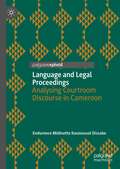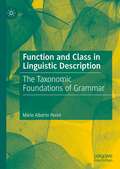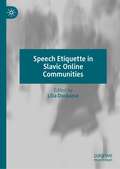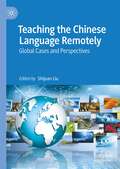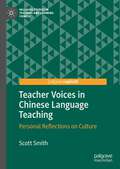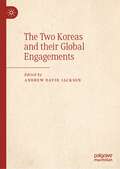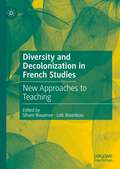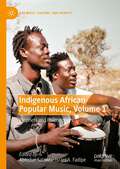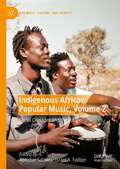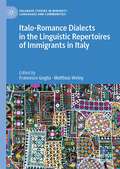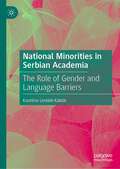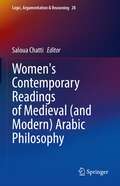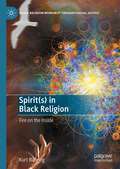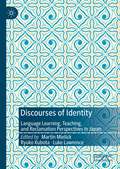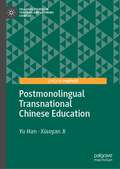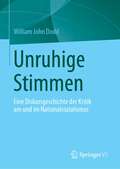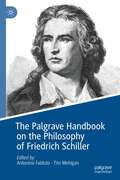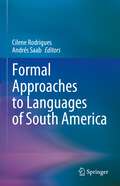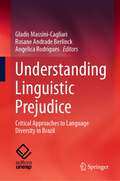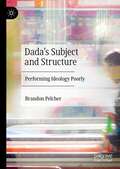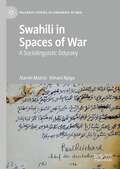- Table View
- List View
Language Contact in Nepal: A Study on Language Use and Attitudes
by Bhim Lal GautamThis book examines language contact and shift in Nepal, a multilingual context where language attitudes and policies often reflect the complex socio-cultural and socio-political relationship between minority, majority and endangered languages and peoples. Presenting the results of a 15-year study and making use of both quantitative and qualitative data, the author presents evidence relating to speakers' opinions and perceptions of mother tongues including English, Hindi, Nepali, Sherpa, Dotyali, Jumli and Tharu. This book explores an under-studied part of the world, and the findings will be relevant to scholars working in other multilingual contexts in fields including language policy and planning, language contact and change, and language attitudes and ideologies.
The Question of Being in Western and African Analytic Metaphysics: Comparative Metaphysics Using the Analytic Framework (Synthese Library #438)
by Grivas Muchineripi KayangeThe main aim of this book is to discuss fundamental developments on the question of being in Western and African philosophy using analytic metaphysics as a framework. It starts with the two orthodox responses to the question of being, namely, the subject-verb-object language view and the rheomodic language view. In the first view, being is conceived through the analysis of language structure, where it is represented by subjects (particulars), objects, and relations (often universals). In the second view, there are different variations; however, the common idea is that the world's structure is revealed in the root verb of terms. This suggests a holistic and dynamic conception of being, where everything is in a continuous process of action. The book builds on analytic philosophy and explores metaphysical concepts such as space-time, modality, causation, indeterminism versus determinism, and mind and body. The book shows that in both Western and African thought, (i) similarities in different studies confirm that philosophy is a universal activity, (ii) differences within a context and beyond confirm the perspectival nature of human knowledge as individuals attempt to interpret reality, and (iii) language influences the conceptualization of being in a particular area. One of the novel aspects is the development of visual and mathematical African models of space and time.
Fusion of Critical Horizons in Chinese and Western Language, Poetics, Aesthetics (Chinese Literature and Culture in the World)
by Ming Dong GuThis book begins with a reflection on dichotomies in comparative studies of Chinese and Western literature and aesthetics. Critiquing an oppositional paradigm, Ming Dong Gu argues that despite linguistic and cultural differences, the two traditions share much common ground in critical theory, aesthetic thought, metaphysical conception, and reasoning. Focusing on issues of language, writing, and linguistics; metaphor, metonymy, and poetics; mimesis and representation; and lyricism, expressionism, creativity, and aesthetics, Gu demonstrates that though ways of conception and modes of expression may differ, the two traditions have cultivated similar aesthetic feelings and critical ideas capable of fusing critical and aesthetic horizons. With a two-way dialogue, this book covers a broad spectrum of critical discourses and uncovers fascinating connections among a wide range of thinkers, theorists, scholars, and aestheticians, thereby making a significant contribution to bridging the aesthetic divide and envisioning world theory and global aesthetics.
The Rise of Chinese as a Global Language: Prospects and Obstacles
by Jeffrey GilThis book investigates the macroacquisition of Chinese – its large-scale acquisition and adoption for various purposes by individuals, governments and organisations – and the implications of this process for the future of English as a global language. The author contextualises the macroacquisition of Chinese within the global ecology of languages, then analyses the factors responsible for the macroacquisition of Chinese, showing, in contrast to most academic and popular commentary, that a character-based writing system will not stop Chinese from becoming a global language. He then articulates three possible future scenarios: English remaining a dominant global language, English and Chinese both being global languages, and Chinese becoming a global language instead of English. The book concludes by outlining directions for further research on the acquisition and use of Chinese around the world. It will be of interest to students and scholars with an interest in English as a global language, Chinese as a second/foreign language, language education policy, and applied linguistics more generally.
Language and Legal Proceedings: Analysing Courtroom Discourse in Cameroon
by Endurence Midinette DissakeThis book investigates language-related problems which arise in courtroom discourse in the Republic of Cameroon, in Central Africa. While Cameroon has over 250 national languages, court cases are conducted in the two official languages: English and French. This is despite the fact that 40% of the adult population is illiterate in these languages, and means that lay litigants often encounter language-related problems during trials. In this study, the author makes use of Speech Act Theory and Interactional Sociolinguistics to analyse the speech acts of both legal professionals and lay litigants as observed in 37 legal cases, demonstrating how the use of exoglossic languages in a highly multilingual nation constitutes a serious issue. The book will be of interest to students and scholars of Forensic Linguistics, Language Policy and Planning, and Discourse Analysis, particularly those with an interest in the African context.
Function and Class in Linguistic Description: The Taxonomic Foundations of Grammar
by Mário Alberto PeriniThis book deals with the traditional problem of the classification of linguistic units, with a primary focus on word classes. The approach is descriptive rather than theoretical, and is based on the use of distinctive features analogous to the ones used in phonology, which entails a radical reworking of the traditional classification. The first part presents some basic notions such as the use of distinctive features and the role of word classes in grammar; classification by prototypes; and the use of world knowledge as a resource to assign thematic relations to constituents in the sentence. In the second part, some descriptive problems are examined, namely the classification of verbs according to valency; connectives, adverbs, and the internal constituents of the NP; and the classification of units larger than words. This book will be of use as a guide for linguists working on the description of natural languages, as well as a resource for students on courses in linguistic theory and description.
Speech Etiquette in Slavic Online Communities
by Lilia DuskaevaThis edited book focuses on speech etiquette, examining the rules that govern communication in various online communities: professional, female, and ethnospecific. The contributors analyze online communication in the Slavic languages Russian, Slovak, Polish, and Belarusian, showing how the concept of speech etiquette differs from the concept of politeness, although both reflect the relationship between people in interaction. Online communities are united on the basis of common informative or phatic illocutions among their participants, and their speech etiquette is manifested in stable forms of conducting discussions – stimulating and responding. Each group has its own ideas of unacceptable speech behavior and approaches to sanitation, and the rules of speech etiquette in each group determine the degree of rapport and distancing between the participants in discourse. The chapters in this book explore how rapport and distance are established through acts such as showing attention to the addressee and increasing his or her communicative status; reducing or increasing the illocutionary power of evaluations and motivations; and evaluating one’s own or someone else’s speech. The volume will be of interest to researchers studying online communication in such diverse fields as linguistics, sociology, anthropology, programming, and media studies.
Teaching the Chinese Language Remotely: Global Cases and Perspectives
by Shijuan LiuThis edited book brings together global perspectives and case studies from five continents to provide an international picture of teaching Chinese remotely. It consists of 15 original chapters by 21 authors from 10 countries. Addressing both practice and research, these chapters collectively offer a comprehensive view of how Chinese language courses worldwide were urgently moved to fully online during the early stages of the Covid-19 pandemic.This edited volume reports fresh and first-hand experiences of Chinese language instructors and students in different countries as well as their perceptions of issues regarding remote teaching and learning in an emergency situation.The book will be of interest to Chinese language teachers and students, as well as scholars with a focus on language education and online teaching and learning more broadly.
Teacher Voices in Chinese Language Teaching: Personal Reflections on Culture (Palgrave Studies in Teaching and Learning Chinese)
by Scott SmithThis book reports the results of an ethnographic study, focusing primarily on the experiences of four teachers of the Chinese language in Australian secondary schools. The author creates an audience for their voices as they reflect on their own understandings of culture, language teaching, and culture in language teaching through semi-structured interviews, and compares these reflections with written stimulus dialogues designed to elicit 'culture-in-language' reflections, as well as curriculum and policy documents produced by the Australian government. The book's findings indicate that teachers of the Chinese language are diverse in their views on culture, language teaching, and the ways in which culture can or should inform language teaching, and the author argues that language teacher intercultural competence cannot be assessed through a synthesis of the current English-only research literature. This book will be of interest to teachers and teacher trainers of Chinese as a foreign language, as well as students and scholars of applied linguistics and language education more broadly.
The Two Koreas and their Global Engagements
by Andrew David JacksonThis book departs from existing studies by focusing on the impact of international influences on the society, culture, and language of both North and South Korea. Since President Kim Young Sam’s segyehwa drive of the mid-1990s, South Korea has become a model for successful globalization. In contrast, North Korea is commonly considered one of the least internationally integrated countries. This characterization fails to account for the reality of the two Koreas and their global engagements. The opening essay situates the chapters by highlighting some significant contrasts and commonalities between the experiences of North and South Korea’s history of engagement with the world beyond the Peninsula. The chapters explore both the longer-term historical influence of Korea’s international contacts as well as specific Korean cultural, linguistic, and social developments that have occurred since the 1990s demise of the global Cold War and greater international integration.
Diversity and Decolonization in French Studies: New Approaches to Teaching
by Siham Bouamer Loïc BourdeauThis edited volume presents new and original approaches to teaching the French foreign-language curriculum, reconceptualizing the French classroom through a more inclusive lens. The volume engages with a broad range of scholars to facilitate an understanding of the process of French (de)colonization as well as its reverberations into the postcolonial era, and a deeper engagement with the global interconnectedness of these processes. Chapters in Part I revist the concept of the "francophonie," decenter the field from “metropolitan” or “hexagonal” and white France and underline how current teaching materials reproduce epistemic and colonial violence. Part II adopts an intersectional approach to address topics of gender inclusivity, trans-affirming teaching, queer materials, and ableism. Finally, Part III presents new ways to transform the discipline by affirming our commitment to social justice and making sure that our classrooms are representative of our students’ enriching diversity.
Indigenous African Popular Music, Volume 1: Prophets and Philosophers (Pop Music, Culture and Identity)
by Abiodun Salawu Israel A. FadipeThis volume explores the nature, philosophies and genres of indigenous African popular music, focusing on how indigenous African popular music artistes are seen as prophets and philosophers, and how indigenous African popular music depicts the world. Indigenous African popular music has long been under-appreciated in communication scholarship. However, understanding the nature and philosophies of indigenous African popular music reveals an untapped diversity which only be unraveled by knowledge of the myriad cultural backgrounds from which its genres originate. Indigenous African popular musicians have become repositories of indigenous cultural traditions and cosmologies.With a particular focus on scholarship from Nigeria, Zimbabwe and South Africa, this volume explores the work of these pioneering artists and their protégés who are resiliently sustaining, recreating and popularising indigenous popular music in their respective African communities, and at the same time propagating the communal views about African philosophies and the temporal and spiritual worlds in which they exist.
Indigenous African Popular Music, Volume 2: Social Crusades and the Future (Pop Music, Culture and Identity)
by Abiodun Salawu Israel A. FadipeThis volume examines how African indigenous popular music is deployed in democracy, politics and for social crusades by African artists. Exploring the role of indigenous African popular music in environmental health communication and gender empowerment, it subsequently focuses on how the music portrays the African future, its use by African youths, and how it is affected by advanced broadcast technologies and the digital media. Indigenous African popular music has long been under-appreciated in communication scholarship. However, understanding the nature and philosophies of indigenous African popular music reveals an untapped diversity which can only be unraveled by the knowledge of myriad cultural backgrounds from which its genres originate. With a particular focus on scholarship from Nigeria, Zimbabwe and South Africa, this volume explores how, during the colonial period and post-independence dispensation, indigenous African music genres and their artists were mainstreamed in order to tackle emerging issues, to sensitise Africans about the affairs of their respective nations and to warn African leaders who have failed and are failing African citizenry about the plight of the people. At the same time, indigenous African popular music genres have served as a beacon to the teeming African youths to express their dreams, frustrations about their environments and to represent themselves. This volume explores how, through the advent of new media technologies, indigenous African popular musicians have been working relentlessly for indigenous production, becoming champions of good governance, marginalised population, and repositories of indigenous cultural traditions and cosmologies.
Italo-Romance Dialects in the Linguistic Repertoires of Immigrants in Italy (Palgrave Studies in Minority Languages and Communities)
by Francesco Goglia Matthias WolnyThis edited book brings together experts on the sociolinguistics of immigration with a focus on the Italo-Romance dialects. Sociolinguistic research on immigrant communities in Italy has widely studied the acquisition and use of Italian as L2 by first-generation immigrants, the maintenance of immigrant languages and code-switching between Italian and the immigrant languages. However, these studies have mostly ignored or neglected to investigate immigrant speakers’ use of Italo-Romance dialects, their awareness of the sociolinguistic situation of majority and minority languages, and their attitudes towards them. Given the important role of Italo-Romance dialects in everyday communication and as a marker of regional identity, this book aims to fill this gap and understand more about the role that these languages play in the linguistic repertoire of immigrants. This book will be of interest to students and scholars of sociolinguistics, minority languages, multilingualism, migration, and social anthropology.
National Minorities in Serbian Academia: The Role of Gender and Language Barriers
by Karolina Lendák-KabókThis book offers an intersectional analysis of secondary and tertiary educational pathways of ethnic Hungarians, Romanians and Slovaks in the Autonomous Province of Vojvodina, Serbia. After a detailed overview of the legal and institutional context of national minority education in Serbia, the book presents qualitative and quantitative research results to illuminate the often invisible linguistic and cultural barriers that national minority high school graduates, university students and faculty may encounter. The author also focuses on the position of national minority women in Serbian higher education and academia, shedding light on the very gendered nature of the ‘glass ceiling’ that often holds members of national minority communities back from career building. This book will be of interest to policymakers seeking nuanced interpretations of multifocal inequalities, as well as academics in fields such as gender studies, migration studies, minority languages and communities, and the sociology of education.
Women's Contemporary Readings of Medieval (Logic, Argumentation & Reasoning #28)
by Saloua ChattiThis book explores a large variety of topics involved in Arabic philosophy. It examines concepts and issues relating to logic and mathematics, as well as metaphysics, ethics and aesthetics. These topics are all studied by different Arabic philosophers and scientists from different periods ranging from the 9th century to the 20th century, and are representative of the Arabic tradition. This is the first book dealing with the Arabic thought and philosophy and written only by women. The book brings together the work and contributions of an international group of female scholars and researchers specialized in the history of Arabic logic, philosophy and mathematics. Although all authors are women, the book does not enter into any kind of feminist trend. It simply highlights the contributions of female scholars in order to make them available to the large community of researchers interested in Arabic philosophy and to bring to the fore the presence and representativeness of female scholars in the field.
Spirit: Fire on the Inside (Black Religion/Womanist Thought/Social Justice)
by Kurt BuhringIn this book Kurt Buhring explores concepts of spirit(s) within various Black religions as a means to make a constructive theological contribution to contemporary Black theology in regard to ideas of the Holy Spirit, or pneumatology. He argues that there are rich resources within African and African-based religions to develop a more robust notion of the Holy Spirit for contemporary Black liberation theology. In so doing, Buhring offers a pneumatology that understands divine power and presence within humanity and through human action. The theology offered maintains the fundamental claim that God acts as liberator of the oppressed, while also calling for greater human responsibility and capability for bringing about liberation.
Discourses of Identity: Language Learning, Teaching, and Reclamation Perspectives in Japan
by Martin Mielick Ryuko Kubota Luke LawrenceThis edited book draws on research on identity in language education to present a detailed and multi-faceted study of identity in language learning, teaching and revitalization settings in the context of Japan. It employs a diverse range of theoretical approaches, including poststructuralism, critical realism, cognitive behavioral theory, and complexity theory,, as well as methodologies such as linguistic ethnography, narrative enquiry, and critical multimodal discourse analysis. The authors focus on multiple dimensions of identity, illuminating linguistic, cultural and human complexity as manifested in language teaching and learning. This book will be of interest to advanced students and scholars of TESOL, applied linguistics, education, Japanese studies, East Asian studies, linguistic anthropology, indigenous languages and sociolinguistics.
Postmonolingual Transnational Chinese Education (Palgrave Studies in Teaching and Learning Chinese)
by Yu Han Xiaoyan JiThis book examines Transnational Chinese Language Education (TCLE) in the Australian context. Taking a post-monolingual perspective, the authors examine Chinese teachers’ monolingual and multilingual practices and mindsets in their educational practices. They find that a Chinese-centric monolingual mindset dominates the Chinese teachers, while a multilingual mindset permeates in their classroom teaching, creating an unconscious tension between the two perspectives. The book proposes that it is the responsibility of teacher educators to train future Chinese teachers with an awareness of this issue, as well as suitable strategies to overcome it and be efficient language teachers. This book will be of interest to applied linguists, pre-service and in-service language teachers, as well as students and scholars of Teaching Chinese to Speakers of Other Languages (TCSOL).
Unruhige Stimmen: Eine Diskursgeschichte der Kritik am und im Nationalsozialismus
by William John DoddIn dieser Diskursgeschichte analysiert W. J. Dodd die "unruhigen Stimmen" von Gegnern, deren zeitgenössische Kritik am Nationalsozialismus sich aus Positionen des territorialen und inneren Exils auf die "Sprache des Nationalsozialismus" konzentrierte. Die einzelnen Kapitel befassen sich mit den "Vorläufer"-Diskursen, dem öffentlichen Diskurs der Nazis von 1933 bis 1945, den Zeugnissen der "unruhigen Stimmen" im Ausland sowie in privaten und veröffentlichten Texten im "Reich", den Versuchen zur "Entnazifizierung der Sprache" (1945-49) und den Hinterlassenschaften der Nazi-Vergangenheit in einem retrospektiven Diskurs der "Aufarbeitung" der Nazi-Vergangenheit. In der Zeit nach 1945 konzentriert sich das Buch auf die Anfechtung der "befleckten Sprache" und die Instrumentalisierung der NS-Vergangenheit sowie auf das Fortbestehen sprachlicher Tabus im zeitgenössischen deutschen Sprachgebrauch. Das Buch, das durchgehend in englischer Übersetzung vorliegt, ist eine unschätzbare Quelle für Wissenschaftler der Diskursanalyse, der Soziolinguistik und der deutschen Geschichte und Kultur sowie für Leser mit einem allgemeinen Interesse an Sprache und Politik.
The Palgrave Handbook on the Philosophy of Friedrich Schiller
by Antonino Falduto Tim MehiganFriedrich Schiller is justly celebrated for his dramas and poetry. Yet, above all, he was a polymath, whose writings enriched a range of fields including history and philosophy. Until now, no comprehensive accounting of this philosophy has been undertaken. The Palgrave Handbook on the Philosophy of Friedrich Schiller makes good this desideratum, treating Schiller's poetry, prose, and dramatic work alongside his philosophical writings and reviewing his thought not only in connection with those who influenced him, such as Kant, Reinhold, and Fichte, but also those he anticipated, such as Hegel, Marx, and the Neo-Kantians. Topics treated in this volume include Schiller's philosophical background, his theoretical writings, Schiller's philosophical writing in light of his entire oeuvre, and Schiller's philosophical legacy. The Handbook also includes an overview of the main topics Schiller addressed in his philosophical writings including philosophical anthropology, aesthetics, moral philosophy, politics and political theory, the philosophy of history, and the philosophy of education. Bringing together the latest research on Schiller and his thought by leading scholars in the field, the Handbook draws attention to Schiller's undiminished importance for philosophical debates today.
Formal Approaches to Languages of South America
by Cilene Rodrigues Andrés SaabThis book analyzes the linguistic diversity of South America based on approaches deeply rooted in the tradition of formal grammar. The chapters brought together in this contributed volume consider native languages all kinds of languages used in the region, including sign languages, indigenous languages and the romance languages (Portuguese and Spanish) originally introduced by European colonizers which underwent processes of transformation giving rise to new, local grammars. One fourth of the language families of the world are located in South America, but the majority of languages in the region are still understudied and out of the radar of theoretical linguistics mostly because their grammars are not well-known by international researchers. This book aims to fill this gap by bringing together studies rooted in the formal grammar approach first developed by Noam Chomsky, which sees language not only as mere corpora attested in oral and written production, but also as expressions of systems of thought and language production which are essential parts of human cognition. The book is divided in three parts – sign languages, romance languages and indigenous languages –, and brings together studies of the following South American languages: Brazilian Sign Language (Libras - Língua Brasileira de Sinais)Argentinian Sign Language (LSA - Lengua de Señas Argentina)Peruvian Sign Language (LSP- Lengua de Señas Peruana)Brazilian PortugueseChilean and Argentinian SpanishQuechuaParaguayan GuaraniA’ingaeMacro-Jê languages Formal Approaches to the Languages of South America will be an invaluable resource both for theoretical linguists and cognitive scientists by providing access to top quality research on understudied languages and enabling these languages to be incorporated into comparative studies that can contribute to advance the knowledge of general principles governing all human languages.
Understanding Linguistic Prejudice: Critical Approaches to Language Diversity in Brazil
by Gladis Massini-Cagliari Rosane Andrade Berlinck Angelica RodriguesThis book discusses linguistic diversity, linguistic prejudice, and language variation and change from a Global South perspective by analyzing Brazilian Portuguese, Brazilian Sign Language (LIBRAS) and indigenous languages spoken in Brazil. It brings together studies and reflections on linguistic prejudice and social discrimination based on data and examples from Brazil and aims to bridge the gap between academic findings and popular notions related to linguistic diversity to promote language diversity and fight linguistic intolerance. Chapters in this volume present contributions to understand the origins and motivations of linguistic prejudice and foster awareness of entrenched opinions regarding linguistic diversity. The first part of the book brings together chapters analyzing basic sociolinguistic questions concerning linguistic prejudice based on theoretical discussions and qualitative research. The second part is composed of chapters that analyze linguistic prejudice in Brazil in major communities that speak Brazilian Portuguese varieties and minor communities that speak native and sign languages. Understanding Linguistic Prejudice: Critical Approaches to Language Diversity in Brazil will be a valuable resource for researchers in sociolinguistics interested in language diversity, language justice and language policy. It will also be of interest to sociologists, anthropologists and other social scientist interested in the relationship between language, diversity, equity and inclusion.
Dada's Subject and Structure: Performing Ideology Poorly
by Brandon PelcherDada’s Subject and Structure argues that Dadaist praxis was far more theoretically incisive than previous scholarship has indicated. The book combines theoretical frameworks surrounding ideological subject formation with critical media and genre histories in order to more closely read Dadaist techniques (e.g. montage, irony, nonsense, etc.) across multiple works. These readings reveal both Dada’s preternatural focus on the discursive aspects of subject formation—linguistic sign, literary manifesto, photographic image, commodity form/aesthetics, which comprise the project’s chapters—and on Dada’s performative sabotage and subversion of them. In addition to highlighting commonalities between Dadaist works, artists, and chapters previously imagined disparate, the book shows how Dada simultaneously prefigured structuralist theories of subject formation and pre-performed post-structuralist critiques of those theories.
Swahili in Spaces of War: A Sociolinguistic Odyssey (Palgrave Studies in Languages at War)
by Alamin Mazrui Kimani NjoguThis monograph examines the roles and functions of Swahili in war/conflict situations, and the impact of wars on the destiny of the language. Covering a period of over a century, the monograph explores this sociolinguistic theme in the context of six wars/conflicts: the Maji Maji resistance against German rule, the two World Wars, the anti-colonial resistance to British colonialism, the wars of the Great Lakes region, the cold wars, and the ongoing war against terrorism. In geographical focus, some of the war situations explored here are “local,” others are “transnational,” and others still rather “global” in scope and ramifications. In the final analysis, the monograph provides important snapshots of the conflict-based history of the Swahili language, demonstrating once again that language is a malleable tool that can be appropriated and galvanized to serve the interests of either party in a conflict and sometimes as a means of creating hegemonic and anti-hegemonic meanings.
